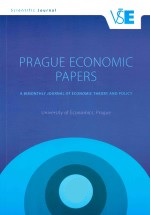Counter-cyclical fiscal policy in developed countries: does governance hinder?
Counter-cyclical fiscal policy in developed countries: does governance hinder?
Author(s): Van Bon NguyenSubject(s): Politics, Economy, National Economy, Economic policy, Public Finances, Fiscal Politics / Budgeting
Published by: Vysoká škola ekonomická v Praze
Keywords: Counter-cyclical fiscal policy; governance; developed countries
Summary/Abstract: Fiscal policy is an effective instrument in helping governments in developed countriesovercome a recession with a high unemployment rate or a hot economy with a high inflationrate to keep the economy on a stable path. Does governance contribute significantlyto keeping this goal in these countries? The study looks for an answer by empiricallyinvestigating the role of governance in the output gap – fiscal policy relationship for a groupof 27 developed countries between 2002 and 2019. It employs the difference GMM ArellanoBond estimators and the PMG estimator for estimation and robustness check. The resultsprovide some interesting findings. Firstly, both public spending and government revenueare counter-cyclical, confirming the counter-cyclical fiscal policy in developed countries.Secondly, governance hinders the counter-cyclical fiscal policy. The findings imply somecrucial policies for governments in developed countries in running the fiscal policy.
Journal: Prague Economic Papers
- Issue Year: 31/2022
- Issue No: 6
- Page Range: 482-508
- Page Count: 26
- Language: English

